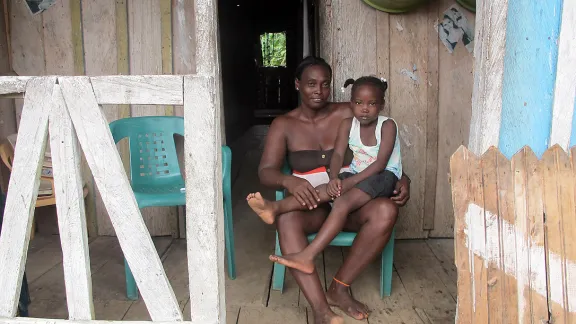
Orlinda Romaña worries about the future of her family as large-scale mining operations take over. Photo: LWF/R.Leskinen
LWF supports community claim to regulate gold mining in Colombia
(LWI) - "If gold mining was no longer possible, I would have to leave,” says Orlinda Romaña, 38, a single mother with seven children who has worked in artisanal mining since she was 11.
“But I do not want to go. I want to stay here. This is my house. I have nowhere to go and I need to work to live well. Mining is the only income I have," she says.
Romaña is one of many inhabitants of the department of Chocó, in Colombia’s west, who have lived off artisanal gold mining for generations. It has provided the means to support their families and to access basic goods and services.
However, this kind of unofficial work was lost with the arrival of large-scale commercial gold mining and the use of heavy machinery. Individuals like Orlinda Romaña can now - at most – only request the permission of the owners of the gold mines to work a day at a time. They have the right to sell any takings from the mine independently under a system known as ‘barequeo’. This needs to be negotiated weekly, bi-weekly or monthly. Unregulated mining causes tension between ethnic communities and between artisans and companies.
False perception of abundance
"There is loss of food sovereignty and there have been changes in traditional economies in rural areas when they become gold mining areas,” says Beatriz Garcia del Campo, Coordinator of the Colombia Program of the Lutheran World Federation.
People who traditionally generated income from gold mining lost that livelihood with the entry of larger gold mining companies, which has resulted in serious environmental impact by destroying arable land in the region.
If gold mining ends, we have to leave. But I do not want to go. I want to stay here. This is my house. I have nowhere to go and I need to work to live well. This is the only income I have.
With the Catholic church in Chocó and local community organizations, such as an organisation of afro-descendant communities in Chocó (COCOMOPOCA) and Tierra Digna, LWF Colombia is addressing this situation.
In a project funded by the European Union and the Church of Sweden, they facilitate community consultations to create more transparency on mining activities. These workshops and information sharing on local legal issues are supported by national and international advocacy through the UN Human Rights Council, and the UN Business and Human Rights Forum.
The only option for the locals is to seek employment with the gold mining companies. But excessive reliance on mining generates a loss of autonomy for the communities, as well as major environmental and social changes, says del Campo.
“There is also a false perception of abundance, as people have money readily available, although now they need to buy what they once produced.” When mining ends, local inhabitants often lose everything: they have been evicted from their land and now must also seek employment elsewhere.
Regulation without affecting livelihood
State abandonment, armed conflict, unemployment, lack of access to health and education and the constant violation of human rights, which unfortunately are a constant in the department of Chocó, add to the environmental and economic damage.
“The state must invest in the area, look for alternatives with communities, create new economic opportunities, create jobs and protect the environment,” says Liseño Bejarano Blandon, a member of the community council in the Pueblo Viejo village. In his opinion - which echoes the sentiment of the entire community - informal gold mining should be regulated, but not declared illegal. “The people of Chocó expect gold mining to be regulated, but without affecting the livelihood of their families.”
The communities that live on the banks of the river Bebará in Chocó are especially concerned as the government has announced a fight against informal and illegal gold mining.
"All the inhabitants of the area live on mining: either working directly in the mines by barequeo, or as transporters," says Yair Rivas. "What we grow is barely enough to feed our families, there’s nothing left to sell."
Contribution by Riikka Leskinen, LWF Colombia


